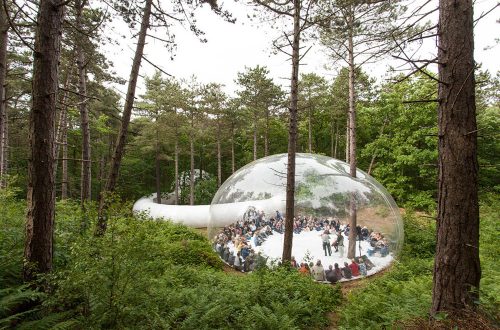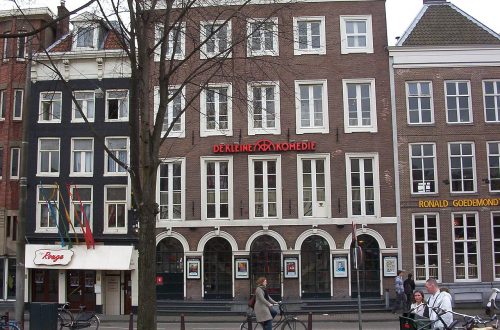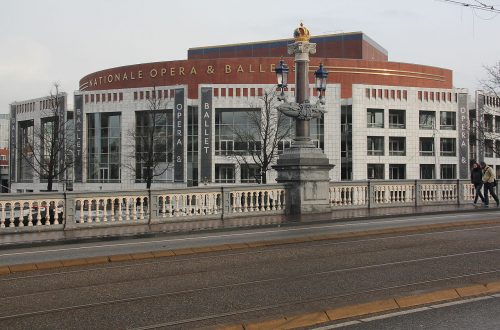
Let’s get digital! Digital Transformation Conference (Den Haag, the Netherlands)
When all cultural institutions in The Netherlands had to close their doors to the public, there seemed to be only one solution: going digital. While some bigger museums, theaters and concert halls already had an extensive online presence or the money to outsource their creation, a big part of the cultural sector was suddenly faced with the preexisting but now urging challenge to translate their vision from tangible to digital. This increase in demand for education, inspiration and tools on the topic led even more cultural institutions to DEN, the Dutch knowledge institute on culture & digital transformation.
Background
DEN (Dutch knowledge institute on culture & digital transformation) is a Dutch sectoral institute that assists the cultural sector in digitization and digital presence. It was originally founded in 1996, back when its original purpose consisted of assisting the development and creation of digital cultural heritage. As the digital demands in society changed and grew, so did DEN. They have evolved into a knowledge institute, providing guidelines on digitizing collections, as well as trainings, seminars, sharing good practices and conferences with topics related to digital transformation, which can be either sector-specific or covering issues affecting all of society. These services exist for everyone that participates in the cultural sector, including artists, heritage professionals, cultural institutions and producers.

The DEN organization consists of nine people who work to operate the organization itself and/or act as consultants, coordinators or content managers. Together, they work on a set of themes, such as public and education; technical matters and innovation; preservation; management and finance and legal matters. DEN also hosts the DEN Academy, which offers courses for heritage professionals to optimize their digital transformation and proficiency.
DEN receives a structural subsidy of €648.381 (2020) from the Dutch ministry of education, culture and science, which is supplemented by incidental funding for projects by several partners (€140.398 in 2020).
As mentioned earlier, a lot of the things DEN offers surrounds the topic of digitization of heritage as a whole. This doesn’t merely mean they focus on how to get your collection online: they aim to digitize the whole cultural experience and inspire artists and producers to create more born-digital content. Questions such as ‘how would you translate a specific cultural experience into an online presence?’ and ‘how do you make sure that online presence has a positive impact on the existing/newly formed bond between your institution and its audience?’ are only a few of the ones DEN strives to solve for any cultural platform that knocks on their door.
Description
Though force- and sorrowful, the measures taken surrounding the Coronavirus did underline the message that DEN had been conveying for years: the digitization of cultural heritage is not only ripe with opportunities – it is becoming necessary. In the first year, while the cultural sector was dealing with various lockdowns, DEN intensified their collecting of examples of online initiatives from the cultural sector and increased their offer of online assemblies in order to meet the increased challenge their audience faced. This congregated into the collection of knowledge, experiences, and experts, and when it became apparent that the necessity of lockdowns and other measures wasn’t letting up anytime soon, DEN started to prepare a conference to bring all these things together.
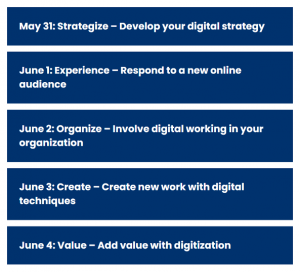
The Digital Transformation Conference started on the 31st of May, 2021, and lasted for five days. The conference was built out of DEN’s focus-model, a tool meant to help cultural institutions and producers develop a thorough digital strategy to maximize success and, more importantly, social impact. Each day had a different main topic (as shown above) based on the four quadrants of the focus-model, and consisted of workshops, lectures and interactive sessions, making sure the conference was interactive and educational for all participating parties. In total, the conference hosted 38 sessions from 57 speakers, covering every aspect of digitization and answering sector-specific questions on how to not only set up an online presence but also how to translate your unique institution to an online platform in an interactive and meaningful way. The conference was attended daily by 140-190 participants, consisting of both individuals and representatives.
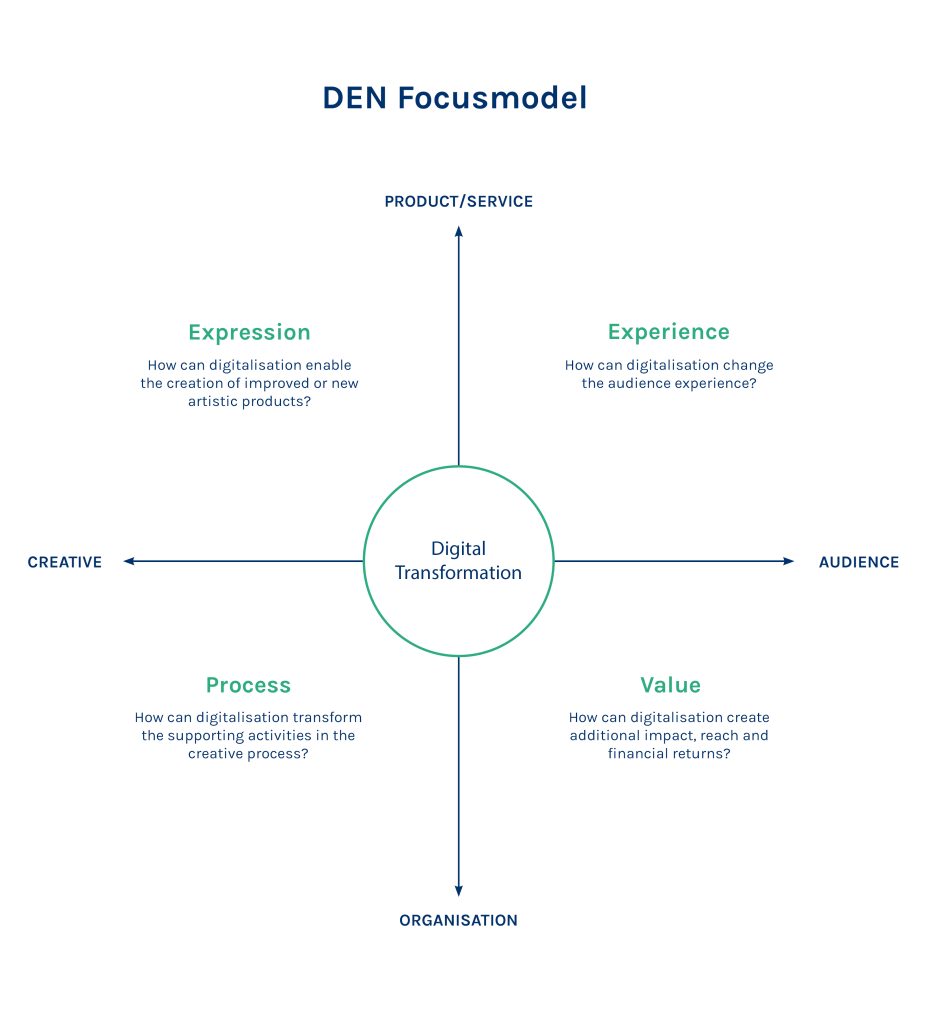
DEN’s Focus modelThe conference helped expand the reach of the knowledge that DEN has accumulated since the day they were founded. The participants acquired new skills which they brought back to their institution or personal businesses, but also contributed to the continuation of the digital transformation. During the sessions they distilled opportunities, such as reaching new target audiences, conglomeration between cultural institutions and an overall better concept by merging physical and digital aspects. Also articulated was what challenges may present themselves during the process of this transformation, such as transforming funds and subsidies for digital initiatives, the extensive initial investment and developing a revenue model for digital content.
While the impact of The Digital Transformation Conference as a singular event is hard to measure, DEN has further cemented its purpose as a knowledge institute on digitization among a broad spectrum of cultural institutions. Right from the beginning, DEN has been able to identify the struggles for the sector as a whole as well as specific branches, that came with the necessity to suddenly go digital, and they have worked hard to try and solve issues such as getting revenue from digital products, figuring out which streaming platform fit what type of product and how to develop and engage more with your digital archive.
DEN’s involvement throughout this period and the Digital Transformation Conference offered expertise to a sector that desperately needed it, along with a way to keep building towards a more maintainable future with digital heritage. Eventually, the outcome of the conference will be made into a proposal to funds and the government, so that the sector will be able to work and get funds more easily in a digital environment. A collection of videos taken from the conference, such as the after movie (as shown below), inspiring keynotes and other highlights, can be viewed here.
Interpretation
By continuing and increasing the collection of knowledge, experience, and expertise during the first year of lockdowns, DEN has managed to turn something that started as an enormous setback for the cultural sector into a running start towards a nationwide development of digital heritage. The resulting conference has given participating individuals and institutions the tools and resilience for managing future obstacles and exploring new ways to share their products with society.
References
- Cohen, M., Senior Advisor at DEN Kennisinstituut cultuur & digitale transformatie, interviewed by N. Kaiser on the 30th of November, 2021
- DEN Kennisinstituut cultuur & digitale transformatie, “Focus model: Successful digital transformation requires an integrated approach”, https://www.den.nl/actueel/artikelen/581/focusmodel-succesvolle-digitale-transformatie-vereist-een-geintegreerde-aanpak
- DEN Kennisinstituut cultuur & digitale transformatie, “The history of DEN”, https://www.den.nl/over-ons/geschiedenis-van-den
- DEN Kennisinstituut cultuur & digitale transformatie, “The Digital Transformation Agenda for the cultural sector” (version June 29th 2021), https://www.den.nl/actueel/artikelen/1004/de-digitale-transformatie-agenda-voor-de-cultuursector
- DEN Kennisinstituut cultuur & digitale transformatie, “Jaarverslag 2020” (December 31st 2020, The Hague), https://www.den.nl/uploads/606c7b4e51abb2a64ca28acbc4dce95022fc2664f624b.pdf
Author
Header photograph
Photo provided by DEN


